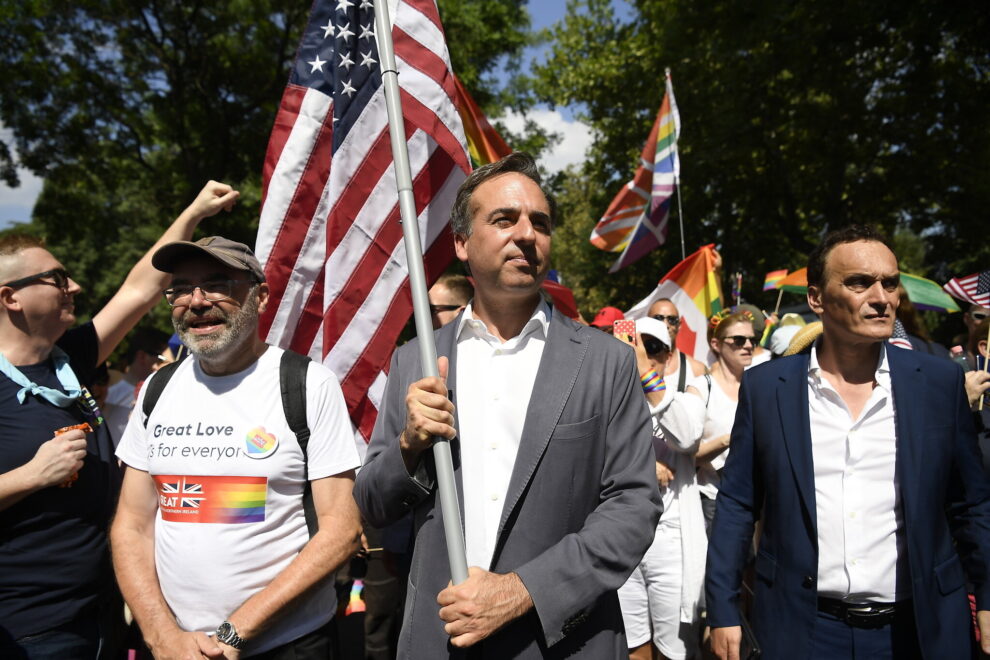Israel reportedly refused to sign onto a joint statement signed by 38 Western countries calling on Hungary’s government to retract laws seen as limiting the rights of the LGBTQ community.
Citing Foreign Ministry officials, a report on the Walla news site said the US State Department asked Israel to sign the statement — which was issued Friday before the Budapest Pride parade — but was turned down.
Israel was reportedly wary of alienating Hungarian Prime Minister Viktor Orban’s government, which has blocked a number of EU measures against Jerusalem.
“We did not want to take part in an attack on Hungary’s government,” a senior ministry official was quoted as saying by the news site.
Opposition leader Yair Lapid slammed the government for not signing onto the joint statement.
“This is a moral and ethical disgrace and another failed diplomatic move. The Israeli government has been taken hostage by an extremist minority of fanatics,” Lapid charged. “Where are the the liberals in Likud?”
Prime Minister Benjamin Netanyahu has long had maintained close relations with Orban, who has been in power since 2010. Their bond has further tightened since Netanyahu’s return to power after the election in November, with the two showering praise upon each other and looking to further both bilateral ties and their own connection.
Budapest has in recent years been Jerusalem’s staunchest supporter in the European Union, blocking several efforts to issue statements critical of Israeli policies. For instance, in 2020, Hungary was one of the only countries that did not speak out publicly against Israel’s plan, since scuttled, to unilaterally annex swaths of the West Bank.
Orban’s right-wing government has also supported the current Israeli coalition’s bid to overhaul the justice system, which resembles steps Budapest took several years ago.
Netanyahu’s current right-wing religious government includes several die-hard opponents of LGBTQ rights, including Noam party MK Avi Maoz, a strident anti-LGBTQ activist; United Torah Judaism MK Yitzhak Pindrus, who said last month that the gay community is more dangerous than Hamas or Hezbollah; and ministers Itamar Ben Gvir and Bezalel Smotrich, who both used to protest against the Jerusalem Pride Parade.
In the joint statement on Friday, signed by the embassies of every EU country except Poland, the signees point to the 28th Budapest Pride festival as playing an important role in fighting for “equal treatment and the full protection of the law” for LGBTQ Hungarians.
The statement expressed “full support for members of the lesbian, gay, bisexual, transgender, queer and intersex (LGBTQI+) community in Hungary and their rights to equality and non-discrimination.”
They said they were concerned with legislation and political rhetoric in Hungary and elsewhere “that is in tension with principles of non-discrimination, international human rights law and human dignity,” and called on governments to cease the stigmatization of LGBTQ people and “to eliminate laws and policies that discriminate against them.”
A day later, thousands of participants of the Budapest Pride march wound through the streets of the Hungarian capital, with marchers voicing their anxiety over the increasing pressure on the LGBTQ community from the country’s right-wing government.
The 28th annual event on Saturday came as the country’s laws, which ban the depiction of homosexuality or gender transition to minors under 18, have begun to be applied with increasing regularity, resulting in fines and other penalties for those who disseminate LGBTQ content.
Before the march, which began in Budapest’s city park, Pride organizer Jojo Majercsik said that while the laws, passed in 2021, didn’t have immediate practical effects, they are now increasingly being used to crack down on LGBTQ visibility.
“You can now see how the propaganda law passed two years ago is being applied in practice and how the public discourse has become more angry,” Majercsik said, referring to the law. “It is now apparent how they are trying to limit the rights of LGBTQ people in the media world, in the world of movies, films and books.”
Source : Times of Israel































